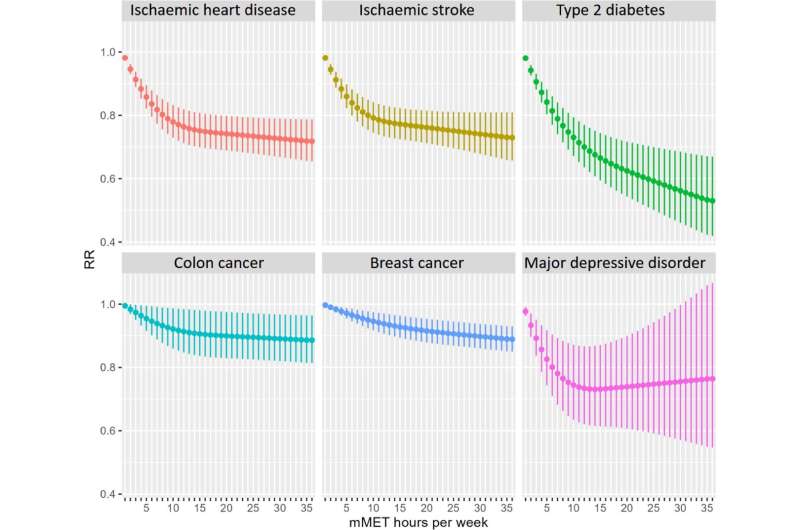This article has been reviewed according to Science X's editorial process and policies. Editors have highlighted the following attributes while ensuring the content's credibility:
fact-checked
peer-reviewed publication
trusted source
proofread
Research finds physical activity in nature helps prevent several diseases, including depression and type 2 diabetes

Physical activity in natural environments prevent almost 13,000 cases of non-communicable diseases a year in England and save treatment costs of more than £100m, new research from the University of Exeter has found.
According to the World Health Organization (WHO) the most common non-communicable diseases—including heart disease, stroke, cancer, diabetes, and chronic lung disease—cause 74% of global mortality. Non communicable diseases, also known as chronic diseases, are not passed from person to person and deaths attributed to these diseases are increasing in most countries.
Physical inactivity is associated with a range of non-communicable diseases, including cardiovascular diseases, type-2 diabetes, cancers, and mental health outcomes. In their Global Status Report on Physical Activity 2022, the WHO estimated 500 million new cases will occur globally between 2020 and 2030 should physical activity remain at today's levels, incurring more than £21b a year in treatment costs.
Natural environments support recreational physical activity, with this new study focusing particularly on places such as beaches and coast, countryside, and open spaces in towns and cities like parks.
Using data including a representative cross-sectional survey of the English population, researchers at the University of Exeter have estimated how many cases of six non-communicable diseases—major depressive disorder, type 2 diabetes, ischemic heart disease, ischemic stroke, colon cancer, and breast cancer—are prevented through nature-based recreational physical activity.
Speaking about the findings, published in Environment International, Dr. James Grellier from the University of Exeter Medical School said, "We believe this is the first time an assessment like this has been conducted on a national scale and we've almost certainly underestimated the true value of nature-based physical activity in terms of disease prevention.
"Although we have focused on six of the most common non-communicable diseases, there are several less common diseases that can be prevented by physical activity, including other types of cancer and mental ill health.
"It's important to note that our estimates represent annual costs. Since chronic diseases can affect people for many years, the overall value of physical activity at preventing each case is certainly much higher."
Increasing population levels of physical activity is an increasingly important strategic goal for public health institutions globally. The WHO recommends that adults aged 18 to 64 should do at least 150 to 300 minutes of moderate intensity aerobic physical activity (or at least 75 to 150 minutes of vigorous-intensity aerobic physical activity) per week to maintain good health. However, globally 27.5% of adults do not meet these recommendations.
In 2019, 22 million adults in England aged 16 years or older visited natural environments at least once a week. At reported volumes of nature-based physical activity, Exeter researchers estimate this prevented 12,763 cases of non-communicable diseases, creating annual health care savings of £108.7m.
Population-representative data from the Monitor of Engagement with the Natural Environment survey were used to estimate the weekly volume of nature-based recreational physical activity by adults in England in 2019.
Researchers used epidemiological dose–response data to calculate incident cases of six non-communicable diseases prevented through nature-based physical activity, and estimated associated savings using published costs of health care, informal care, and productivity losses. It's estimated the health care cost of physical inactivity in England in 2019 is approximately £1b.
Dr. James Grellier from the University of Exeter Medical School said, "For people without the access, desire, or confidence to take part in organized sports or fitness activities, nature-based physical activity is a far more widely available and informal option. We believe that our study should motivate decision-makers seeking to increase physical activity in the local population to invest in natural spaces, such as parks, to make it easier for people to be physically active."
More information: James Grellier et al, Valuing the health benefits of nature-based recreational physical activity in England, Environment International (2024). DOI: 10.1016/j.envint.2024.108667




















